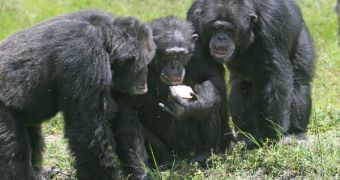Humans have been until recently the only known species that did not seek to maximize its daily energy intake from foods, but rather planned its diet over a longer time-frame. However, a new ecological study conducted in the Bolivian rainforest has proven that wild spider monkeys do the exact same thing, planning their protein intake to a point where their diet remains relatively unchanged, regardless of the season they are in, or the availability of certain foods. This level of control plays an important role in keeping obesity in humans in check, and researchers believe the monkeys use it for the very same purpose.
Anthropologists have thus far believed that humans formed their eating habits somewhere in the Palaeolithic era, between 2.4 million and approximately 10,000 years ago. But the new research, conducted by scientists at the Australian National University, in Canberra, Australia, shows that the origins of human feeding patterns may actually be a lot older than first believed, and that they may actually arise from the common ancestors we share with existing primates.
“We found that the pattern of nutrient intake by wild spider monkeys, which are primarily fruit eaters, was almost identical to humans, which are omnivores. What spider monkeys and humans have in common is that they tightly regulate their daily protein intake, i.e. they appear to aim for a target amount of protein each day, regardless of whether they only ate ripe fruit or mixed in other vegetable matter as well. Finding this result in spider monkeys was unexpected because, previously, ripe fruit specialists were thought to be 'energy maximizers,'” ANU Fenner School of Environment and Society Departmental Visitor Dr. Annika Felton, who has led the Bolivian study, said.
“In other words, they would aim to maximize their daily energy intake. Our findings show this is not the case. The consequence of tight protein regulation is the same for monkeys and humans: if the diet is poor in protein but rich in carbohydrates and fats (energy dense food) individuals will end up ingesting a great deal of energy in order to obtain their protein target, which can lead to weight gain. This 'protein leverage effect' is thought to play a significant role in the human obesity problem found in modern western societies. Our results suggest that an adjustment of the nutritional balance of diets as a means to manage human obesity might similarly be an option for mitigating obesity in captive primates,” she added, quoted by ScienceDaily.
“What is perhaps most fascinating about our paper is not the answers we provide, but the questions that our findings raise. For example, why do these frugivores have the same pattern of nutritional intake as human omnivores? Is this due to convergent evolution or is it a remaining trait from a common ancestor? I am also pleased that our findings can be applied to the management of captive primates, and possibly the management of spider monkey forest habitat,” the expert concluded.

 14 DAY TRIAL //
14 DAY TRIAL //